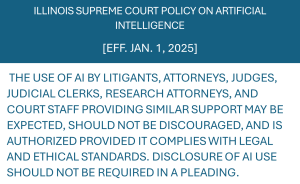Search
AI and the Practice of Law: Will Lawyers Be Replaced?
There’s a growing belief in Silicon Valley that artificial intelligence isn’t just about replacing some jobs—it’s about replacing all of them. One tech investor recently told a room of startup founders, “You can replace the world’s workers – all of them. You can capture their salaries. All of them.”¹
This kind of incendiary absolutism fuels anxiety in nearly every profession, but few as acutely as law. As generative AI systems grow more capable, lawyers are rightly asking: Will AI replace us? And if not entirely, then when, and how? This article examines the state of AI in law as of mid-2025, surveying its effects on legal workflows, its limitations, and its plausible trajectory.
The short answer is that AI will not replace lawyers wholesale—but it will displace many of the tasks they currently perform. The legal field is facing not extinction but evolution.
AI in Legal Practice: Transformational Tool, Not Autonomous Actor
By 2024, 79% of surveyed law firms reported some adoption of AI tools for internal tasks like research, drafting, or summarization.² Most of these tools leverage large language models (LLMs) such as GPT-4 or Claude, which can ingest prompts and generate grammatically sophisticated legal prose. Use cases already include:
- Drafting memos, motions, and correspondence;
- Legal research and case summarization;
- Discovery review, summation and issue spotting;
- Generating direct and cross-examination,
- Reviewing contracts and highlighting risk;
- Generating questions, themes, and case strategies.
- Brainstorming legal arguments and helping lawyers think through tough cases,
- Formulating legal arguments to the intended audience or individual
- Simulating jury perspectives or refining voir dire.
Tools such as CoCounsel, Harvey, Matey, and even consumer-facing products like ChatGPT are being tested in these contexts.³ However, lawyers are finding that these tools require strong prompt engineering and critical oversight. AI can hallucinate citations, misstate holdings, and fail at applying jurisdiction-specific standards.⁴
 So far, productivity gains appear modest. A 2025 study from the National Bureau of Economic Research showed that AI chatbots had no statistically significant impact on hours worked or wages earned across professions, including law.⁵ While AI saved some users time, the average time savings was around 3%, with many users reinvesting that time correcting AI-generated errors.⁶
So far, productivity gains appear modest. A 2025 study from the National Bureau of Economic Research showed that AI chatbots had no statistically significant impact on hours worked or wages earned across professions, including law.⁵ While AI saved some users time, the average time savings was around 3%, with many users reinvesting that time correcting AI-generated errors.⁶
In other words, generative AI is a collaborator—not a replacement. It’s closer to a tireless but legally unqualified intern. This reality tempers Silicon Valley’s ambition and reasserts a central truth: human oversight remains legally and ethically nonnegotiable.
The Junior Lawyer Bottleneck
Still, even incremental efficiencies have consequences. If a single AI-augmented lawyer can complete tasks that once required a team, then hiring models will inevitably shift. Analysts are already seeing signs of this at the entry level. According to The Atlantic, law is among several professions seeing declining entry-level job offers, even as senior positions remain relatively stable.⁷ Harvard economist David Deming has noted that AI is best suited to tasks often assigned to junior professionals: synthesizing documents, drafting summaries, producing routine filings.⁸
If this continues, law firms may gradually thin their associate ranks, favoring smaller teams of AI-literate attorneys who can do more with less. Paralegal and support roles may be particularly vulnerable.
But what AI can’t yet do, and likely won’t anytime soon, is strategize, persuade, or practice judgment. AI cannot sit with a client facing prison and help them decide whether to plead. It cannot cross-examine a witness, negotiate with a prosecutor, or deliver a sentencing narrative rooted in psychodrama or ABT structure. These are not just tasks; they are acts of advocacy. They are human. AI is excellent in helping the lawyer prepare for all of these tasks.
Regulatory and Ethical Limits
Efforts to sidestep lawyers entirely have already run afoul of unauthorized practice laws. In 2023, a tech startup planned to use an AI-powered “robot lawyer” to argue a traffic case in court, only to abandon the plan after receiving credible threats of prosecution.⁹
Meanwhile, courts have sanctioned attorneys for filing briefs containing fictitious case law generated by AI.¹⁰ These cautionary tales reinforce that AI tools cannot operate autonomously within legal systems. Attorneys remain the gatekeepers of both ethical duties and factual accuracy.
The Real Future: Lawyers Who Use AI
If there’s a slogan that captures the near-term outlook, it’s this: AI won’t replace lawyers, but lawyers who use AI will replace those who don’t.
Clients will soon expect the speed and responsiveness AI makes possible. Courts will demand precision and efficiency. The future belongs not to technologists or traditionalists alone, but to legal professionals who can combine AI’s speed with their own seasoned judgment.
In this evolving landscape, prompt engineering is not a gimmick, it’s a legal skill. AI literacy is not optional – it’s a component of competence under Rule 1.1. And emotional intelligence, the one thing AI still cannot fake, will become more valuable, not less.
The legal profession is not being replaced. It’s being redefined. The question is not whether AI will change how we practice, it already has. The question is whether we, as lawyers, will learn how to wield it well.
Check out our Substack – AI on Trial
 AI on Trial explores how artificial intelligence is transforming legal practice – and what lawyers need to know to adopt it safely. Written for criminal defense attorneys and the broader legal community, each article cuts through the hype to examine AI’s genuine capabilities, serious limitations, and evolving implications for professional responsibility. From prompt engineering techniques that improve forensic analysis to the ethical obligations courts are now demanding, AI on Trial delivers measured, practical guidance on staying ahead of rapid change in the profession.
AI on Trial explores how artificial intelligence is transforming legal practice – and what lawyers need to know to adopt it safely. Written for criminal defense attorneys and the broader legal community, each article cuts through the hype to examine AI’s genuine capabilities, serious limitations, and evolving implications for professional responsibility. From prompt engineering techniques that improve forensic analysis to the ethical obligations courts are now demanding, AI on Trial delivers measured, practical guidance on staying ahead of rapid change in the profession.
Articles Referenced:
¹ Ed Newton-Rex, For Silicon Valley, AI Isn’t Just About Replacing Some Jobs. It’s About Replacing All of Them, THE GUARDIAN (May 12, 2025), https://www.theguardian.com/commentisfree/2025/may/12/for-silicon-valley-ai-isnt-just-about-replacing-some-jobs-its-about-replacing-all-of-them?CMP=oth_b-aplnews_d-1 (last visited May 20, 2025).
² Wolters Kluwer & Above the Law, Generative AI in Law Firms Survey (July 26, 2023), https://www.wolterskluwer.com/en/news/survey-reveals-lawyers-increasingly-see-generative-ai-as-opportunity-not-threat (last visited May 20, 2025).
³ Darrow AI, Will AI Replace Lawyers? What to Expect for the Future of Law (Jan. 5, 2025), https://www.darrow.ai/blog/will-ai-replace-lawyers (last visited May 20, 2025).
⁴ Sara Merken, New York Lawyers Sanctioned for Using Fake ChatGPT Cases in Legal Brief, REUTERS (June 26, 2023), https://www.reuters.com/legal/legalindustry/new-york-lawyers-sanctioned-using-fake-chatgpt-cases-legal-brief-2023-06-22/ (last visited May 20, 2025).
⁵ Michael Barclay, AI Is Storming Workplaces—and Barely Making a Difference, Study Says, QUARTZ (May 18, 2025), https://qz.com/ai-chatbots-productivity-study-nber-1851781299 (last visited May 20, 2025).
⁶ Adam Rowe, Study: AI Chatbots Have ‘No Significant Impact’ on Hours or Pay, TECH.CO (May 19, 2025), https://tech.co/news/ai-chatbots-productivity-no-impact (last visited May 20, 2025).
⁷ Derek Thompson, Something Alarming Is Happening to the Job Market, THE ATLANTIC (Apr. 30, 2025), https://www.theatlantic.com/economy/archive/2025/04/job-market-youth/682641 (last visited May 20, 2025).
⁸ Id.
⁹ Bobby Allyn, A Robot Was Scheduled to Argue in Court. Then Came the Jail Threats, NPR (Jan. 25, 2023), https://www.npr.org/2023/01/25/1151029466/robot-lawyer-ai-court-do-not-pay-jail-threats (last visited May 20, 2025).
¹⁰ Id.; see also Merken, supra note 4.
 Michigan Criminal Defense Lawyer Blog
Michigan Criminal Defense Lawyer Blog

